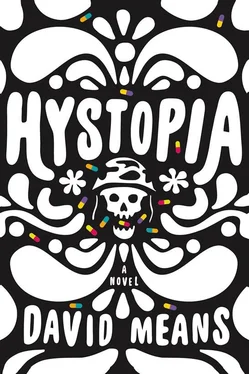Hank stood and then Singleton stood, reaching down to pull Wendy up. Then Meg stood and they walked away from the fire to the water and stood looking out at the lake. The air smelled autumnal. A trillion leaves changing color and beginning to decay. The fire behind them looked small and insignificant.
They sat by the fire deep into the night, sharing stories, while the wind picked up, shifted, and forced them to change positions to avoid the smoke.
At one point, later, Singleton walked away from the fire and went into the darkness to listen again for Black Flaggers.
The plan was to go back to the house, finish packing up, pray at MomMom’s grave, and head to Duluth. Hank knew the way. He stood up and raised his hands and said he could, if necessary, walk the footpaths all the way in his sleep, blindfolded, drunk, high. Then he gave a shout and, his voice preachy and declarative, said that going into nature was the ultimate recourse, a way back into his own soul and the only resolution available in conditions that were, when you got right down to it, considering the state of the supposedly civilized industrial world, unbearable. He pounded his chest and spread his arms to the sky, cried out again, and then, pulling her up to her feet, embraced Meg in his huge arms.
All afternoon they had worked, burning things, burying the arms they wouldn’t take, anything they didn’t want to leave to Black Flag, or the Corps agents who would inevitably come on a search mission. Singleton sat for a while and composed a final report on a sheet of legal paper. He kept it short and to the point, outlining their original plan of action, describing the trip up, the initial contact with Hank and Meg, and the last contact with Agent Klein. The actual establishment of trust, he reduced to a single sentence: “ We used our guts to establish that the targets were loving .” To use the word loving in an operation report went completely against training. It didn’t matter. He was leaving a lot out.
Hank came into the kitchen and sat down. “I’m sorry we didn’t keep Rake alive so you could come and save the day the way I’m sure you wanted to,” he said. “You were hoping for some kind of gallantry, something symbolic. But symbols are why Rake fell for the trap. He had a hankering for old gestures, so when the duel rumor began floating around he fell for it, because it fulfilled the idea that there was a mission buried in all of his rage. He thought he might land on the moral high ground. He might land on some idea of honor in relation to himself, man, and that’s the thing, man, that’s the thing that can really mess you up. Nothing is more corrupt than the idea of honor, at least right now, in this day and age. I love trees because they don’t bother with honor, because they move slowly through the years — at least from our vantage — and reckon with time in a different way.”
* * *
The plan was to drive as far as they could, until they didn’t feel safe, and from there take backcountry trails to Duluth, where Hank would make a token gesture of searching for his father, moving from tavern to tavern, checking in with the harbormaster, eyeing the lake, which would be shimmering and tense-looking with the winter cold, getting ready to freeze up. Then they’d stay a few days together, take the final four blue pills in one last party, see what transpired, and split up if that seemed the right thing to do. Meg and Hank would head over the border to Canada and spend the winter in Thunder Bay. When spring came they’d begin searching for the Queen Tree, the mother of all mothers, which Hank guessed was somewhere in Quetico Provincial Park. It was crazy, he admitted, but it kept him going and like all good delusions it was fueled by genuine hope and dedication to the truth. Singleton and Wendy would, perhaps, stay in Duluth into the spring — see how they liked it up there, and then, when the smoke cleared, if it ever cleared, they’d head back down to Michigan to find her father. They’d avoid headquarters, if it still existed.
Singleton left the report on the kitchen table. He left it there for someone to find.
There had been rumors and theories about what were called exchanged memory packets. According to the rumor there was a way to abolish the desire to know what had been enfolded in treatment by meeting up with one or two folks who had a common trauma. It was still just a theory, and had yet to be supported by studies. Back at headquarters, some committee was pondering the question, examining log sheets and intelligence data, speculating about sample cases, men who had accidentally linked up with other men (or women) and shared enough to establish that they had been in the same unit, somewhere in Nam, or in a chopper bay, a medic and his charge, or a pilot looking back to check the baggage and seeing the eyes of a dying boy afraid of death as he pulled back on the joystick and sent the bird skyward, and for some reason the pilot could never forget that particular moment. The pilot meets the guy he thought was dead and together they smoke a joint around a campfire and rehash that scene and in doing so feel the lifting of the chopper and the joy of recognition around their mutually enfolded materials. The eyes hadn’t been fading to death after all.
There was another story — rumor or truth, it was impossible to know — about two men who went off the Grid after treatment, hitched rides and hopped trains and ended up deep in the wilds of Mark Twain National Forest down in Tennessee, each on separate journeys that would lead them together, by pure chance, in that strange way that people meet against all odds, straphanging in a crowded subway train amid the multitudes of New York, for example, having just arrived in the city from disparate points, randomly arriving from, say, Los Angeles and Miami, and then suddenly finding themselves side by side on the subway, swaying in a miraculous confounding of mathematical possibility, and there they were, saying hello, laughing it off as one of those things that happened. Those two men had been in a horrendous massacre together and had each returned injured on separate dust-offs and had no contact whatsoever and then, in the Tennessee woods, in a long, beautiful glade of grass, coming in from the northerly side and the southerly, they had approached each other with trepidation until, about halfway across, according to the story, recognition set in and they waved and shouted greetings and danced around each other. It was a scene of requited love, most agreed, because when the love of two buddies in battle was broken apart, it was like the splitting of atoms into pure anguish.
Then there was the hugely improbable rumor about the agent from the Corps, one of three men who had gone over to Nam to fight the second siege of Hue (that point was always made) and been caught in the furious fight for the Citadel. The agent had been enfolded and treated at the facility near Flint, coming out of his reenactment ready to be part of Kennedy’s grand vision, not caring one bit about the itch in his head (in most versions), paying it no heed, pairing up with a young female agent whose father was a vet and who had lost her boyfriend to the war. Some versions had him dead, others seriously injured. The two of them went AWOL (in some versions) from the Psych Corps on a mission to the Upper Peninsula of Michigan to find and locate a target, who by chance happened to have been a guy in his unit and not only that but had a girl with him up there, too, along with another guy — this was the amazing part, the part that kept the story riding — who had paired himself up with his buddy after the war, the two of them raging mad, not ready to finish the war, never really home if you know what I mean, and the guy — big burly guy — had enfolded himself behind his buddy’s back. So they got up there, the two agents, and began to exchange memory packets, small bits that they had unfolded — the usual way, good fucking and cold dunking — to find overlap, to seal the deal with what had happened, so to speak, and at this point the rumor broke apart and scattered over the hills and mountains. In one version the duel was mentioned and it was explained that the young girl, who had been in love with a grunt who never came back, had a part in it, played a role, and they fooled the psycho grunt into having a formal standoff with another guy, a twerp (in all versions), and they switched out the ammo and he was blown away, died in a blaze of glory, and in another version they just shot him and burned his body beyond recognition and dog-tagged him (that version got traction ahead of the other version and spread to New York). In all versions the stress was put on the beautiful ending. Four folks up there sharing stories, trading memory packets, finding grace with most of the trauma gone, the horrific parts. In both versions, the four headed out to Canada. In one version it was the Arctic Circle where they lived amid the Inuits, learned the language, helped to build igloos, spending nights in the wonderful heat — no heat like an igloo heat, with ice walls between you and the howling winds — and in another version they built themselves a log cabin, a real one, and shared the household duties together in a communal bliss, growing their own pot and mixing up bark to make new drugs, blissfully wallowing in a mutual love that was far beyond anything you could imagine unless it was on the lips of a man who was telling the story, shaking his head and saying, Man, can you fucking believe it, man, they had the best of both worlds, man, got to share what they could and leave the rest submerged. In still other versions of the story, the four of them performed a sequential dunking, going out into Lake Superior one by one, watching over each other, taking care not to go under too long, coming out of the water with new visions and new information, piecing it together methodologically, carefully, and then drawing a line when it got too close to a complete unfold, stopping when the stopping was good, so to speak, and then one blissful evening — always at a kitchen table, drinking wine, lifting glasses in toasts — they got the story straight and agreed that each of them had lost the same buddy. They toasted his name and then bowed and prayed for him, knowing that he was listening, sure that he could hear each word. Then they left ahead of the violence, slipped away. Most versions of the rumor included Hank’s tree-smelling abilities, his woodsman know-how, and the fact that he was key in the long trek out of the hinterlands of northern Michigan to the border. Some versions had them hiking all the way west to Duluth, staying off the main roads, camping on Keweenaw Peninsula, invigorating themselves with talk and drink, and then, thanks to Hank’s connections with deckhands and the like, they settled into the town for the winter, where they explained they were waiting to ship out in the spring. In other versions they went east to Sault Ste. Marie and somehow fought their way past the guards there in a glorious Wild West, High Noon kind of shootout. (That version was a favorite west of St. Louis.) Early on in the formation of the rumor, allusion was made to a strange document floating around, passed from hand to hand in the form of a final report that had been found in the house up there east of the Harbor of Refuge, written in the jargon of the Corps, on a few sheets of legal pad paper, addressed to a man named Klein, describing in detail how the operation had proceeded up to but not including the final sequential dunking. In another version a blue pill was mentioned, along with the fact — always stated by the one telling the story, to stamp the validity of the narrative — that the pills had been provided by another grunt, back at Corps headquarters, a pill with fantastic powers — better than LSD or STP or QRD or whatever — to produce visions that were clear in the best way. On the Bible, someone would say, I swear, man, this is a true story, and then they’d go on to tell one version or another, east or west, final dunking, no dunking, final blue pill blowout of interwoven visions, no blue pill, but always ending in happiness and glory.
Читать дальше












